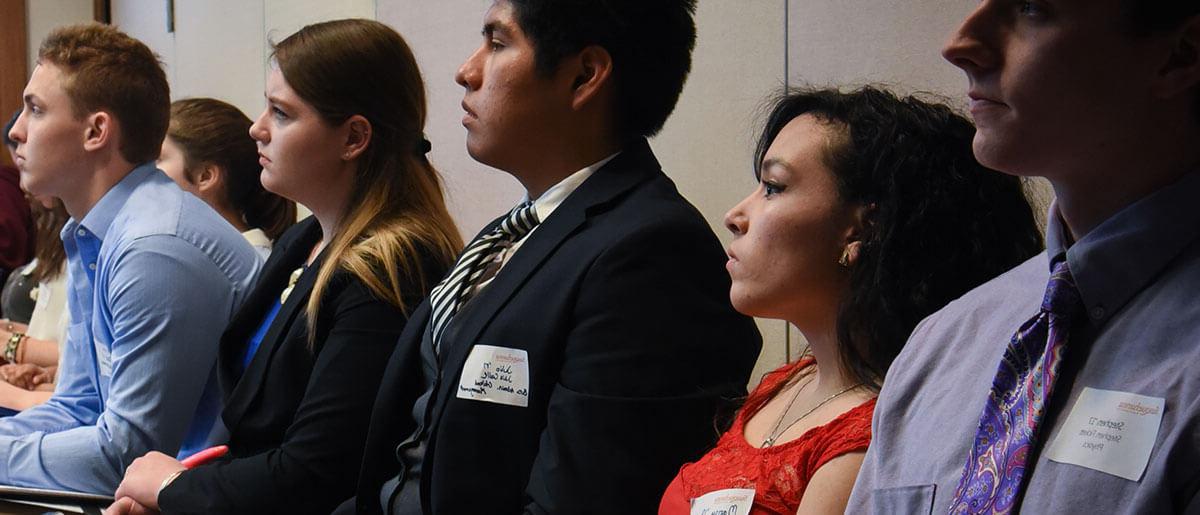Career Planning Pathway
It’s not about finding your path — it’s about creating it. In today’s rapidly changing and competitive job market, career planning has become an essential aspect of your college journey. Working with Susquehanna’s Career Development Center, you will plan your career throughout your college years. This proactive approach will not only enhance your employability but also empower you to shape your own professional destiny.
Student Guide to Career Development
First Year: Discover
- Meet the Career Development staff: Schedule an appointment with a Career Advisor to discuss your strengths, values, interests and goals.
- Activate your Handshake account: Access campus jobs, internships, career opportunities, events and programs in your areas of interest.
- Start to build your college resume: Join student organizations that interest you, volunteer in the community and/or obtain a campus job. Use the resume guides on the Career Development Center’s mySU page or Handshake to draft a resume then have it reviewed by a Career Advisor!
- Consider your interests/discover career paths for your major: Review the academic course catalog, websites like onetonline.org and bls.gov/ooh, and the “What Can I Do With This Major” resource via mySU to identify and explore potential majors and minors.
- Develop professional relationships: Connect with your faculty who will guide your academic development. Attend first-year experience programs to learn more about campus resources and staff who can help you!
- Create your LinkedIn Profile and launch your SU LinkedIn Learning account: Gain access to our network of 15,000+ alumni, research companies, unlock learning experiences taught by real-world professionals, and apply for jobs and internships.
Sophomore Year: Explore
- Investigate your interests: Attend career programs and workshops, and our employment, internship, and graduate school fairs to learn how to and experiences related to your interests.
- Connect with professionals, alumni, faculty and staff: Conduct informational inter views with alumni and others to learn about potential career paths. When possible, shadow a professional in your eld of interest.
- Connect with faculty and staff who can inform you of opportunities connected to your career interests.
- Search for opportunities: Update your Handshake account and LinkedIn profile to find and apply for campus jobs and internships.
- Update your resume: Have your resume reviewed by a Career Advisor.
- Participate in Break Through career treks and on-campus events to learn from alumni working in your fields of interest.
- Engage in a LinkedIn Learning course: Learn skills, gain knowledge, and earn credentials to prepare you for internships and careers.
- Build your experience: Take an active role in a student or volunteer organization to develop and enhance your career readiness skills.
- Ensure that your social media accounts are appropriate and professional.
Junior Year: Connect
- Set career goals: Develop a career action plan in conjunction with Career Advisors and academic advisor.
- Participate: Attend recruiting events, career fairs, networking events and workshops.
-
Network with alumni at Break Through events both on and off campus.
Identify a mentor (or mentors) and complete informational inter views with professionals aligned with your career goals. - Seek a leadership position(s) with a student organization, serve as a teaching or research assistant, obtain on-campus employment and more!
- Create or update your LinkedIn account, ask super visors for skill endorsements and complete LinkedIn Learning courses.
- Expand your knowledge: Study on-campus, complete an internship or research experience, and volunteer. Apply for experiential education funds to assist with internships and other opportunities that complement your studies.
- Graduate School Track: Research graduate schools and register to take the appropriate entrance exams. Update your resume/CV and discuss plans with faculty mentors and Career Advisors.
- Workforce Track: Update your resume and begin asking faculty and professional contacts for permission to use them as a professional reference.
Senior Year: Achieve
- Meet with a Career Advisor early in your senior year to strategize and finalize your post graduate plans. Have Career Advisors, faculty, and mentors review your application materials.
- Engage: Attend campus workshops and events to learn more about the job search, applying to graduate school, interviewing, professional etiquette, and negotiating salary/benefits.
- Network with and inter view professionals in the industries, locations and companies that interest you by attending job fairs and other events.
- Confirm that your social media presence and LinkedIn profile are employer appropriate; show engagement with your field of interest.
- Schedule a practice job or graduate school inter view to hone your presentation skills.
Graduate School Track
- Schedule a practice job or graduate school inter view to hone your presentation skills.
- Research graduate schools and register for the appropriate entrance exams.
- Draft and revise personal statements.
- Ask professional contacts to write letters of recommendation.
- Update your resume/CV and discuss plans with faculty mentors and Career Advisors.
-
Submit your graduate school applications EARLY!
Workforce Track
- Ask faculty and professional contacts for permission to use them as a professional reference.
- Update your resume, draft and revise cover letters.
- Track the applications you submit to ensure appropriate follow-up!



